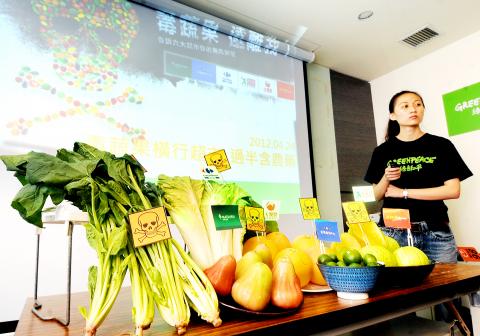A second round of tests on fruit and vegetables sold at six of the nation’s main supermarkets and wholesale chains showed that hazardous pesticide residues were found on 20 of the 36 products tested, Greenpeace Taiwan said yesterday.
The organization released its first report on pesticides in February, in which it revealed that 74 percent of fruit and vegetables examined in December contained 36 types of pesticide residue, with one fruit product containing residues of nine types of pesticide.
This time the survey found residues of a pesticide with reproduction toxicity — carbendazim, which may cause harm to fetuses — on items from all six of the chains surveyed, the organization said in its report.

Photo: Fang Pin-chao, Taipei Times
It added that procymidone, azoxystrobin and dimethomorph, which can cause infertility, were found on items from one of the wholesale chains.
Greenpeace Taiwan’s agriculture project manager Tsai Szu-ting (蔡絲婷) said eight of the fruit products tested contained more than three types of pesticide residues, with oranges sold at Pxmart wholesalers containing eight types, kumquats sold at Matsusei supermarkets containing six types and strawberries sold at Pxmart wholesalers containing five types of residue.
Moreover, among the eight types of pesticide found in oranges, flucythrinate and carbofuran were considered as highly hazardous by the WHO, Tsai said.
The US Environmental Protection Agency has in 2009 banned carbofuran residues on food sold in the US.
“The organization has communicated with the supermarkets after announcing the first report in Feburary, but the stores only chose to pull the problem items off the shelves, without taking other positive actions to change the situation and they cannot protect consumers from health problems,” Tsai said.
Although the doses of pesticide residues found on the samples were not high, the organization is concerned about the combination effect — which it compared to mixing cocktails — of several pesticides on human health, Tsai said.
A mixture of several pesticides could be even more hazardous than only a single type of toxic agent, Tsai said.
The organization said pulling the tainted products off the shelves was not a responsible solution to resolve the problem, and urged supermarkets and wholesale stores to promise to consumers that they would enforce a strict ban on pesticides listed as highly hazardous by the Council of Agriculture, as extremely hazardous and highly hazardous by the WHO, and also pesticides affecting reproduction or causing damage to bees’ pollination abilities.
Greenpeace Taiwan also suggested establishing tracing systems for fresh food products, to monitor and control the safety of foodstuffs for consumers.

Taiwanese can file complaints with the Tourism Administration to report travel agencies if their activities caused termination of a person’s citizenship, Mainland Affairs Council Minister Chiu Chui-cheng (邱垂正) said yesterday, after a podcaster highlighted a case in which a person’s citizenship was canceled for receiving a single-use Chinese passport to enter Russia. The council is aware of incidents in which people who signed up through Chinese travel agencies for tours of Russia were told they could obtain Russian visas and fast-track border clearance, Chiu told reporters on the sidelines of an event in Taipei. However, the travel agencies actually applied

Japanese footwear brand Onitsuka Tiger today issued a public apology and said it has suspended an employee amid allegations that the staff member discriminated against a Vietnamese customer at its Taipei 101 store. Posting on the social media platform Threads yesterday, a user said that an employee at the store said that “those shoes are very expensive” when her friend, who is a migrant worker from Vietnam, asked for assistance. The employee then ignored her until she asked again, to which she replied: "We don't have a size 37." The post had amassed nearly 26,000 likes and 916 comments as of this

New measures aimed at making Taiwan more attractive to foreign professionals came into effect this month, the National Development Council said yesterday. Among the changes, international students at Taiwanese universities would be able to work in Taiwan without a work permit in the two years after they graduate, explainer materials provided by the council said. In addition, foreign nationals who graduated from one of the world’s top 200 universities within the past five years can also apply for a two-year open work permit. Previously, those graduates would have needed to apply for a work permit using point-based criteria or have a Taiwanese company

The Shilin District Prosecutors’ Office yesterday indicted two Taiwanese and issued a wanted notice for Pete Liu (劉作虎), founder of Shenzhen-based smartphone manufacturer OnePlus Technology Co (萬普拉斯科技), for allegedly contravening the Act Governing Relations Between the People of the Taiwan Area and the Mainland Area (臺灣地區與大陸地區人民關係條例) by poaching 70 engineers in Taiwan. Liu allegedly traveled to Taiwan at the end of 2014 and met with a Taiwanese man surnamed Lin (林) to discuss establishing a mobile software research and development (R&D) team in Taiwan, prosecutors said. Without approval from the government, Lin, following Liu’s instructions, recruited more than 70 software